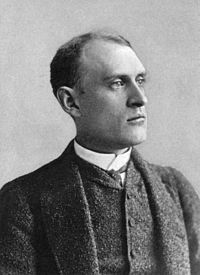Eugene Field
Eugene Field | |
|---|---|
 Eugene Field | |
| Born | September 2, 1850 |
| Died | November 4, 1895 (aged 45) |
| Occupation | American writer |
Eugene Field (September 2, 1850 - November 4, 1895) was an American writer, best known for his children's poetry and humorous essays.
Field was born in St. Louis, Missouri. After the death of his mother he was raised by a cousin in Amherst, Massachusetts.
Field attended Williams College in Massachusetts. His father, Roswell Field, died when he was nineteen and he dropped out after eight months. Next he went to Knox College in Galesburg, Illinois but dropped out after a year. Then he went to the University of Missouri, where his brother was also attending. He tried acting and studied law with little success. He then set off for a trip through Europe but returned to the United States six months later, penniless. Field then set to work as a journalist for the Gazette in Saint Joseph, Missouri in 1875. The same year he married Julia Comstock, with whom he had eight children. For the rest of his life he arranged for all the money he earned to be sent to his wife, saying that he had no head for money himself.
Field soon rose to become city editor of the Gazette.
He became known for his light, humorous articles written in a gossipy style, some of which were reprinted by other newspapers around the country.
From 1876 through 1880 Field lived in St. Louis, first as an editorial writer for the Morning Journal and subsequently for the Times-Journal. After a brief stint as managing editor of the Kansas City Times, he worked for two years as editor of the Denver Tribune.
In 1883 Field moved to Chicago where he wrote a humorous newspaper column called Sharps & Flats for the Chicago Daily News. His home in Chicago was near the intersection of N. Clarendon and W. Hutchinson in the neighborhood now known as Buena Park.
He first started publishing poetry in 1879, when his book Christian Treasures appeared. Over a dozen more volumes followed and he became well known for his light-hearted poems for children, perhaps the most famous of which is "Wynken, Blynken, and Nod".
Field died in Chicago at the age of 45. He is buried at the Church of the Holy Comforter in Kenilworth, Illinois, although his 1901 biography by S. Thompson states that he was originally buried in Graceland Cemetery in Chicago.
Several of his poems were set to music with commercial success. Many of his works were accompanied by paintings from Maxfield Parrish. His former home in St. Louis is now a museum and a memorial to him, consists primarily of a statute of the "Dream Lady" from his poem, "Rock-a-by-Lady," was erected in 1922 at the Lincoln Park Zoo in Chicago. There is also a park and fieldhouse named in his honor in Chicago's Albany Park neighborhood.
Field has his own star on the St. Louis Walk of Fame. Numerous elementary schools throughout the Midwest are named for him, e.g. Eugene Field Elementary School in Wheeling, IL.
External links
- The Duel The fairy tale, lushly illustrated in The Colorful Story Book of 1941.
- Works by Eugene Field at Project Gutenberg
- Ballad of Waller Lot (Buena Park, Chicago)
- Wynken, Blynken, and Nod, Knox College's children's and young adult literary publication
- The Duel, aka The Gingham Dog and The Calico Cat hear song version of the poem
